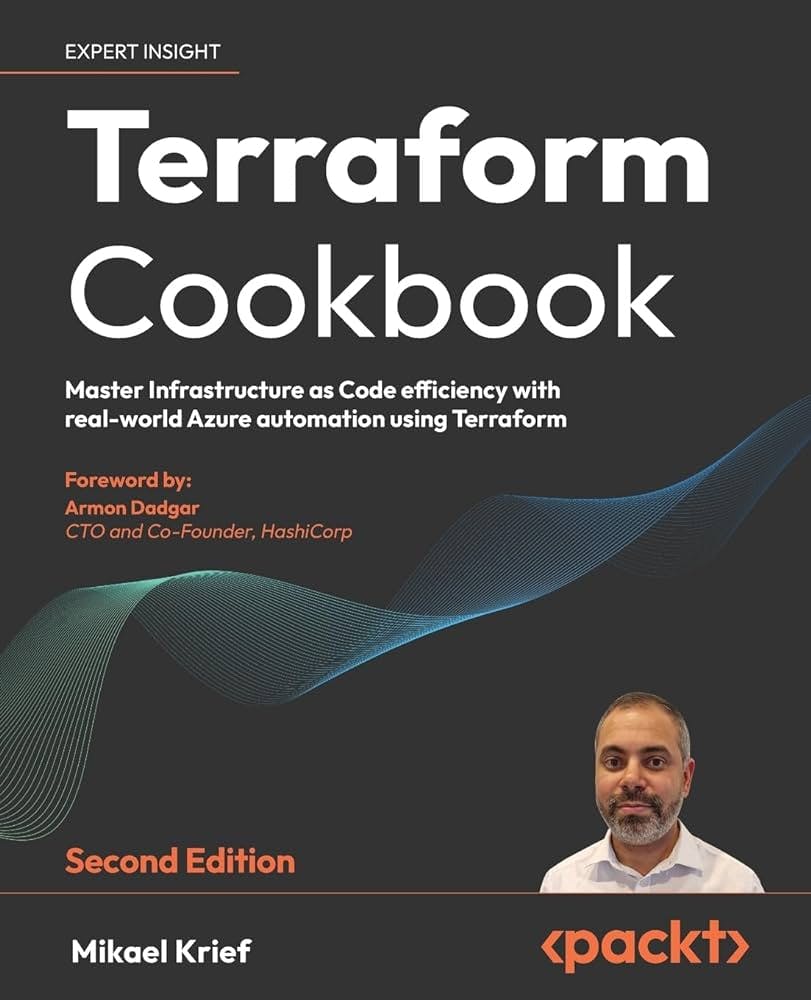Mastering Cloud Infrastructure Provisioning with the 'Terraform Cookbook' - A Book Review
In the ever-evolving cloud computing landscape, mastering infrastructure as code (IaC) has become a vital necessity for organizations seeking agility, scalability, and efficiency. The "Terraform Cookbook" by Mikael Krief, with a foreword by Armon Dadgar, CTO of HashiCorp, emerges as an indispensable resource for those embarking on the journey of cloud infrastructure provisioning and management using Terraform.
Target Audience:
This book caters to a diverse audience, ranging from cloud architects and infrastructure engineers to developers seeking to streamline their deployment processes. Whether you're new to Terraform or an experienced practitioner, the "Terraform Cookbook" offers a comprehensive exploration of Terraform's capabilities, empowering you to provision, run, and scale cloud architectures with confidence.
Comprehensive Coverage:
The book's breadth is truly impressive, encompassing a wide array of topics that span the entire Terraform ecosystem. From setting up your Terraform environment and writing configurations to scaling infrastructure and leveraging external data sources, the chapters meticulously guide you through real-world examples and best practices.
Key Chapters:
Setting up Terraform Environment: This introductory chapter equips you with the foundational knowledge to set up your Terraform environment, ensuring a smooth start to your infrastructure automation journey.
Writing Terraform Configurations: Dive into the art of crafting Terraform configurations, exploring language constructs, modules, and advanced techniques for building scalable and maintainable infrastructure as code.
Scaling Infrastructure with Terraform: Discover strategies for seamlessly scaling your infrastructure, leveraging Terraform's capabilities to accommodate the ever-changing demands of modern applications.
Managing Terraform State: Gain insights into managing Terraform state, a crucial aspect of maintaining consistency and reproducibility across your infrastructure deployments.
Cloud Infrastructure with Terraform: Explore real-world examples of provisioning infrastructure on major cloud platforms, including Azure, AWS, and GCP, ensuring a smooth transition to the cloud of your choice.
Terraform for Docker and Kubernetes Deployments: Harness the power of Terraform to streamline containerized application deployments, simplifying the management of Docker and Kubernetes environments.
Testing, Compliance, and Automation: Dive into best practices for testing, compliance, and automating your Terraform workflows, ensuring reliability, security, and scalability throughout the entire infrastructure lifecycle.
Terraform Cloud and Troubleshooting: Leverage the capabilities of Terraform Cloud, HashiCorp's managed service, and equip yourself with troubleshooting techniques to overcome common challenges encountered during infrastructure provisioning.
Practical Insights and Real-World Examples:
One of the book's standout features is its emphasis on practical insights and real-world examples, which sets it apart from many theoretical resources available on the market. The author, Mikael Krief, draws upon his extensive experience in the field, providing invaluable perspectives and techniques that can be readily applied to real-world scenarios.
Managing Terraform State: The book dives deep into the critical aspect of managing Terraform state, which is essential for maintaining consistency and reproducibility across infrastructure deployments. Through detailed explanations and practical examples, readers gain a comprehensive understanding of state management best practices, including strategies for secure state storage, remote state management, and state locking mechanisms.
Leveraging External Data Sources: Terraform's ability to leverage external data sources is a game-changer for organizations seeking to integrate infrastructure provisioning with dynamic data sources. The "Terraform Cookbook" dedicates a section to this powerful feature, offering insights into leveraging data from various sources, such as cloud provider APIs, databases, and external configuration management tools, to build truly dynamic and adaptable infrastructure.
Automated Testing and Compliance: Ensuring the reliability and security of infrastructure is paramount in modern cloud environments. The book addresses this concern by providing a comprehensive guide to implementing automated testing and compliance checks within Terraform workflows. Readers will learn best practices for unit testing, integration testing, and compliance enforcement, enabling them to catch issues early and maintain a high level of confidence in their infrastructure deployments.
Real-World Cloud Provider Examples: The book shines in its coverage of real-world examples across major cloud providers, including Azure, AWS, and GCP. Through detailed walkthroughs and code snippets, readers gain practical experience in provisioning and managing infrastructures on these platforms, ensuring a smooth transition to the cloud environment of their choice.
Docker and Kubernetes Deployments: In today's containerized world, the ability to seamlessly integrate Terraform with Docker and Kubernetes is invaluable. The "Terraform Cookbook" dedicates a chapter to this topic, equipping readers with the knowledge and skills required to streamline containerized application deployments, simplifying the management of complex Docker and Kubernetes environments.
With its wealth of practical insights and real-world examples, the "Terraform Cookbook" empowers readers to navigate the complexities of infrastructure provisioning and management with confidence, enabling them to build scalable, reliable, and secure cloud architectures using Terraform.
What I Enjoyed:
As an avid reader, I found the "Terraform Cookbook" to be an absolute delight. The author's clear and concise writing style made complex concepts accessible, while the wealth of practical examples and code snippets facilitated hands-on learning. I particularly enjoyed the book's coverage of managing Terraform state, which is a critical aspect of maintaining infrastructure consistency. Additionally, the chapters on testing, compliance, and automation provided invaluable insights into best practices for ensuring the reliability and security of Terraform-managed infrastructures.

Conclusion:
Whether you're an experienced cloud professional or a newcomer seeking to unlock the power of infrastructure as code, the "Terraform Cookbook" by Mikael Krief is an invaluable addition to your technical library. With its comprehensive coverage, practical examples, and expert insights, this book empowers you to navigate the complexities of cloud infrastructure provisioning and management with Terraform, enabling you to stay ahead in the ever-evolving cloud computing landscape.
As an avid reader and contributor to the knowledge-sharing community, I find immense joy in unraveling the layers of insightful books. In a recent series, I've been sharing knowledge extracted from the books I explore, aiming to create a space for collective learning.
This review is a collaboration with Packt, a commendable source for staying updated on book releases and community growth! ❤️
